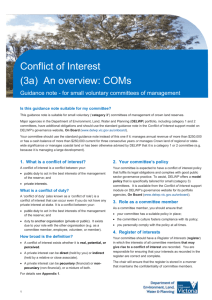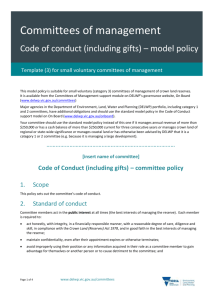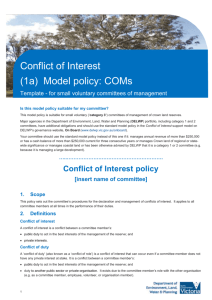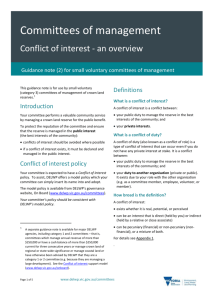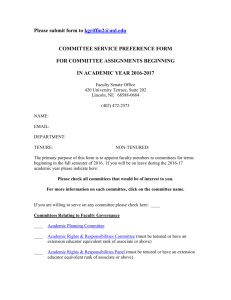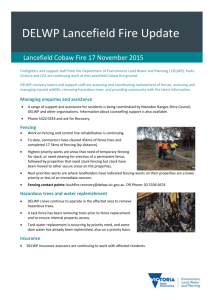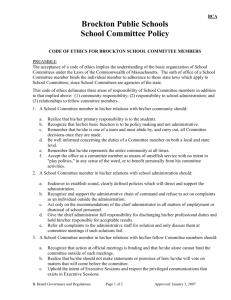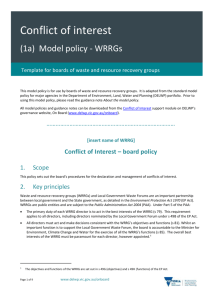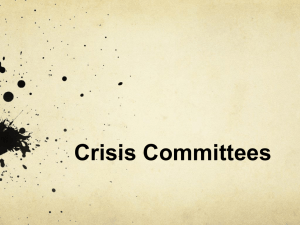Standards of conduct [MS Word Document
advertisement
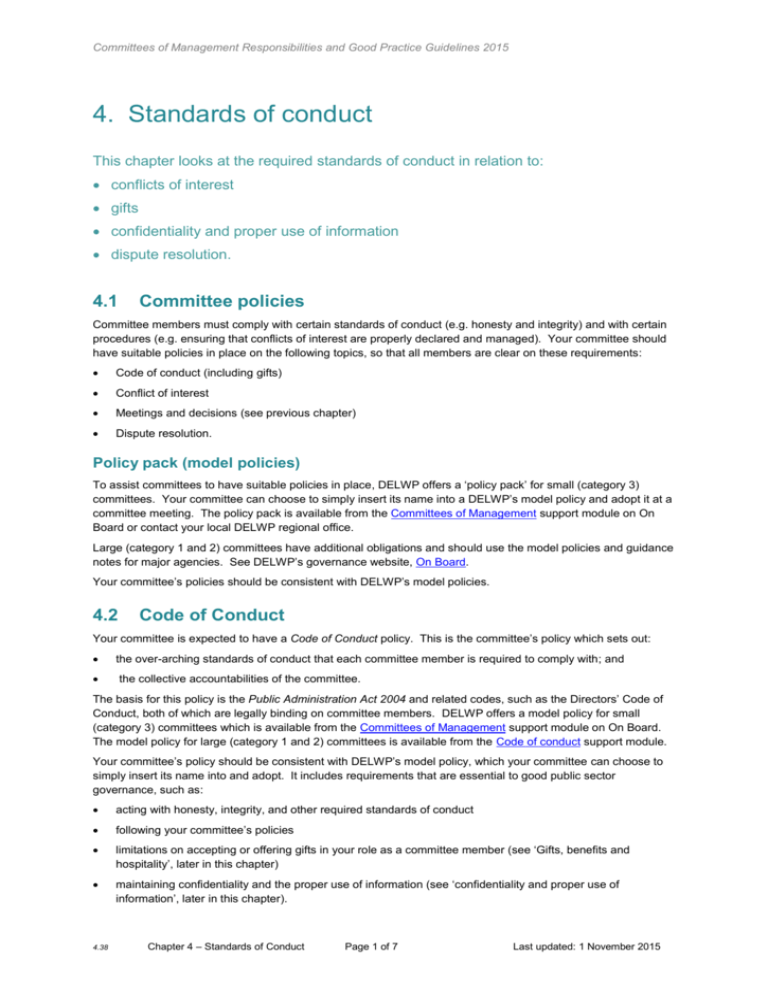
Committees of Management Responsibilities and Good Practice Guidelines 2015 4. Standards of conduct This chapter looks at the required standards of conduct in relation to: conflicts of interest gifts confidentiality and proper use of information dispute resolution. 4.1 Committee policies Committee members must comply with certain standards of conduct (e.g. honesty and integrity) and with certain procedures (e.g. ensuring that conflicts of interest are properly declared and managed). Your committee should have suitable policies in place on the following topics, so that all members are clear on these requirements: Code of conduct (including gifts) Conflict of interest Meetings and decisions (see previous chapter) Dispute resolution. Policy pack (model policies) To assist committees to have suitable policies in place, DELWP offers a ‘policy pack’ for small (category 3) committees. Your committee can choose to simply insert its name into a DELWP’s model policy and adopt it at a committee meeting. The policy pack is available from the Committees of Management support module on On Board or contact your local DELWP regional office. Large (category 1 and 2) committees have additional obligations and should use the model policies and guidance notes for major agencies. See DELWP’s governance website, On Board. Your committee’s policies should be consistent with DELWP’s model policies. 4.2 Code of Conduct Your committee is expected to have a Code of Conduct policy. This is the committee’s policy which sets out: the over-arching standards of conduct that each committee member is required to comply with; and the collective accountabilities of the committee. The basis for this policy is the Public Administration Act 2004 and related codes, such as the Directors’ Code of Conduct, both of which are legally binding on committee members. DELWP offers a model policy for small (category 3) committees which is available from the Committees of Management support module on On Board. The model policy for large (category 1 and 2) committees is available from the Code of conduct support module. Your committee’s policy should be consistent with DELWP’s model policy, which your committee can choose to simply insert its name into and adopt. It includes requirements that are essential to good public sector governance, such as: acting with honesty, integrity, and other required standards of conduct following your committee’s policies limitations on accepting or offering gifts in your role as a committee member (see ‘Gifts, benefits and hospitality’, later in this chapter) maintaining confidentiality and the proper use of information (see ‘confidentiality and proper use of information’, later in this chapter). 4.38 Chapter 4 – Standards of Conduct Page 1 of 7 Last updated: 1 November 2015 Committees of Management Responsibilities and Good Practice Guidelines 2015 4.3 Conflict of interest Conflicts of interest should be avoided where possible. If a conflict exists, it must be declared and managed in the public interest. This means it must be resolved in the best interests of managing the reserve on behalf of the Victorian community, rather than in the best interests of a committee member or any organisation to which he or she owes a duty. Conflict of Interest policy Your committee should have a Conflict of Interest policy that fulfils its legal obligations and complies with good public sector governance practice. DELWP’s model policy for small (category 3) committees is available from the Committees of Management support module on On Board. The model policy suitable for large (category 1 and category 2) committees is available from the Conflict of interest support module. Register of interests Your committee should have a Register of Interests in which the interests of all committee members that may give rise to a conflict of interest are recorded. You are responsible for ensuring that your interests as recorded in the register are correct and complete. The chair will ensure that the register is stored in a manner that maintains the confidentiality of committee members. Confirming your interests are complete and correct The chair will bring the Register of Interests to all committee meetings. At the start of each meeting, he or she will ask you and the other committee members to confirm that your interests as recorded in the register are complete and correct. If there are no changes, the minutes will note that ‘all committee members present confirmed that their entries in the Register of Interests are complete and correct’. If you have new interests that are not yet included in the register you must declare them, so that they can be recorded in the minutes. The chair will then arrange for them to be entered into the register. What is the definition of a conflict of interest? A conflict of interest is a conflict between: your public duty to act in the best interests of the management of the reserve; and your private interests. A ‘conflict of duty’, also known as a ‘conflict of role’, is a conflict of interest that can occur even if you do not have any private interest at stake. It is a conflict between: your public duty to act in the best interests of the management of the reserve; and your duty to another organisation (private or public). It exists due to your role with the other organisation, for example, as a committee member, employee, volunteer, or member. How broad is the definition? The definition of a conflict of interest is broad. The following applies to all conflicts of interest, including conflicts of duty: Real, potential or perceived A conflict of interest exists whether it is: real – it currently exists potential – it may arise, given the circumstances perceived – members of the public could reasonably form the view that a conflict exists or could arise that may improperly influence the performance of your duty as a committee member, now or in the future. 4.38 Chapter 4 – Standards of Conduct Page 2 of 7 Last updated: 1 November 2015 Committees of Management Responsibilities and Good Practice Guidelines 2015 Direct or indirect A private interest can be: direct - held by you indirect - held by a relative or close associate, for example: an immediate family member, such as a spouse, partner, child, parent, sibling or other relative; a regular household member; a friend; a business associate; or a rival or enemy. Pecuniary or non-pecuniary A private interest can be pecuniary (financial) or non-pecuniary (non-financial), or a mixture of both. It can arise from a wide range of personal or professional/business-related sources. Pecuniary interests - include actual, potential, or perceived financial gain or loss. Money does not need to change hands. The interest exists if you or a relative or close associate: own property hold shares, investments or other business interests have a position in a company bidding for government work receive benefits such as concessions, discounts, gifts or hospitality from a particular source hold office in a corporation (public, private or trustee), an incorporated association, or other entity have any other relevant financial interest, for example, are: entitled to receive income derived from a contract a beneficiary or trustee of a trust entitled to receive income from an office held for payment/reward or from a trade, vocation, or profession. Non-pecuniary interests - may arise from your personal or family relationships, or from your involvement in sporting, social, or cultural or other activities. They include a tendency towards favour or prejudice resulting from friendship, animosity, or other personal involvement with another person or group. If your personal values are likely to impact on the proper performance of your public duty, this can also lead to a conflict of interest. Declaring a conflict of interest at the start of a committee meeting At the start of each committee meeting the chair should ask you and the other committee members present to declare any interest (private interest or duty to another organisation) you have in relation to any item on the agenda. You must declare any such interest even if it is already recorded in the register. If, during the meeting, you realise that you have an undeclared interest, declare it immediately. Similarly, if you believe another member may have an undeclared interest, raise a query to enable him or her to declare the interest, if it exists. 4.38 Chapter 4 – Standards of Conduct Page 3 of 7 Last updated: 1 November 2015 Committees of Management Responsibilities and Good Practice Guidelines 2015 Options for managing a conflict of interest The committee must manage all conflicts of interest in the public interest. Depending on the particular conflict, options for managing a conflict of interest are: 1. Remove – the committee member with the conflict leaves the room and does not participate at all in any discussion or decision-making on the ‘conflicted’ matter. 2. Record – details of the conflict of interest are recorded in the minutes. Monitoring occurs to check whether this remains the appropriate option. 3. Restrict – the member’s involvement in discussion and/or decision-making on the matter is restricted to the extent that matches the public interest. Monitoring occurs to check whether this remains the appropriate option. 4. Recruit – an impartial third party is engaged to provide advice, such as a probity adviser, lawyer, or governance expert from DELWP or the Victorian Public Sector Commission. 5. Relinquish or resign – the committee member relinquishes their private interest or steps down from their role with the other organisation on a temporary or permanent basis. Alternatively, the committee member resigns from the committee itself. It is up to the committee, not the individual member with the conflict, to determine how a conflict of interest will be dealt with. The process that the committee should use for deciding is set out below. It starts with the committee determining whether the conflict is ‘material’ (serious). Is the conflict material? The committee should start by deciding whether the conflict is material (serious). To do so, it should take into account all the relevant factors and circumstances, including: the objectives and functions of the committee the matter that is to be discussed and determined the nature of the conflict - for example, is it real, potential, or perceived? the severity of the conflict, including: the amount, scope, and likelihood of any expected benefit - for example, is it a large benefit primarily to the member or a small benefit that thousands of people including the member will receive? any other relevant circumstances - for example, if the conflict relates to a member’s partner working at an organisation about which the committee is to make a decision: is the partner currently working there as the CEO? Or did they leave a few years ago from a large organisation in which their work was not connected to the decision being made by the committee? the potential effect of the conflict, including: the extent to which the member’s ability to make an impartial decision in the public interest could be compromised, or could reasonably be seen to be compromised the overall likelihood that the conflict of interest may affect public confidence in the integrity of the committee and its decisions. The standard procedure for dealing with a material conflict of interest is ‘remove’ – that is, for the member with the conflict to leave the room and not take part in any discussion or decision-making on the issue. For a nonmaterial conflict, there is more likelihood that a lesser option will be in the public interest. See below for details. 4.38 Chapter 4 – Standards of Conduct Page 4 of 7 Last updated: 1 November 2015 Committees of Management Responsibilities and Good Practice Guidelines 2015 Managing a material conflict of interest Standard procedure The committee’s standard procedure for managing a material conflict of interest should be to remove the ‘conflicted’ member from all participation in the matter. The member should: leave the room at the start of the relevant agenda item and not return until the start of the next agenda item; not discuss the matter at all with any other committee member (either in the meeting or elsewhere); and not participate in any committee decision on the matter. The standard procedure should be followed unless the committee determines and records in the minutes clear reasons why it is not in the public interest. Stronger option If the public could reasonably form the view that the conflict is of unacceptable frequency and/or duration then to maintain public confidence and protect the reputation of the committee it may be necessary, in the public interest, for the ‘conflicted’ member to: relinquish their private interest resign or stand down on a temporary basis from the other organisation to which he or she has a duty, or resign from the committee. If the committee is unsure whether a stronger option is in the public interest the local regional DELWP office should be contacted for advice. Lesser options A lesser option (record, restrict or recruit) will not usually be in the public interest for managing material conflicts of interest. If the committee is unsure whether a lesser option is in the public interest it should err on the side of caution. If the committee decides on a lesser option then, in addition to recording in the minutes why it is in the public interest, careful monitoring should occur to ensure that the lesser option remains appropriate. Examples Examples of where a lesser option may be in the public interest are: Discussion: If the ‘conflicted’ member was appointed on the basis of their knowledge of the matter then it may be in the public interest for them to be present for part of the committee’s discussions. However, if an ‘unconflicted’ member is absent who also has this expertise then it will usually be in the public interest for discussion to be held over to the next meeting instead. Decision: If the recommended procedure would mean that there is no quorum for the decision even if all ‘unconflicted’ members are present then a lesser option will be in the public interest. However, if ‘unconflicted’ member(s) are absent then it will usually be in the public interest for the decision to be held over to the next meeting instead. Managing a non-material conflict of interest For a non-material conflict of interest, there is more likelihood that a lesser option (record, restrict or recruit) will be in the public interest. In making its decision, the committee will take into account all relevant factors and circumstances. For example, the lower the severity of the conflict, the more likely that a lesser option will be in the public interest. If the committee decides on a lesser option then, in addition to minuting why it is in the public interest, careful monitoring should occur to ensure that it remains appropriate. For example, the committee may initially determine to only ‘record’ the conflict but after monitoring may decide instead that the member can participate in part of the discussion but must be ‘removed’ from all decision-making on the matter. 4.38 Chapter 4 – Standards of Conduct Page 5 of 7 Last updated: 1 November 2015 Committees of Management Responsibilities and Good Practice Guidelines 2015 If the committee is unsure whether a lesser option is in the public interest it should err on the side of caution and decide on the standard procedure of ‘remove’ – that is, the member leaves the room and does not participate in any discussion or decision-making on the matter. Recording in the minutes The minutes of the committee meeting should record: a description of the interest and the conflict (the $ value of a financial interest does not need to be included) whether the conflict is material how it will be managed - including, if an option other than ‘remove’ is decided upon, why it is in the public interest where applicable, the times and item (or part thereof) for which the ‘conflicted’ member is absent from the room. What if your committee’s policy is breached? If you may have breached your committee’s Conflict of Interest policy, notify the chair immediately. If you believe another committee member may have breached the policy but not notified the chair, advise the chair or approach the other member, who should then notify the chair. If the committee decides a breach has occurred, the regional director of DELWP should be notified. 4.4 Gifts, benefits and hospitality Unless good reason exists otherwise, committee members should avoid accepting or giving gifts in their role as a committee member. A ‘gift’ is a free or heavily discounted item or service (e.g. an offer to paint your fence at a reduced rate). The term ‘gift’ also includes a benefit or hospitality that exceeds common courtesy (e.g. an offer of a cup of coffee is a common courtesy, an offer of a $100 glass of wine is a gift offer). The more valuable or significant a gift, the less likely that it will be in the public interest to accept or give it. When in doubt, committee members should err on the side of caution. The local regional office of DELWP can be contacted for advice. In particular, the following requirements apply: When a gift offer must be refused You must: never solicit gifts always refuse and report any attempt to bribe you never accept any gift that may cast doubt on your integrity or impartiality or that of the committee. Examples of gifts that must never be accepted include: gifts from a donor who is likely to be affected by a decision that the committee makes, now or in the future (e.g. from a person who is likely to apply for a contract or tender with the committee) money or other items that are easily converted into money. The above restrictions apply to gifts offered to a committee member directly or indirectly (e.g. grand final tickets offered to the spouse of a committee member by someone who is seeking a licence from the committee). Note that a gift offer ‘to the reserve’ also needs consideration to determine whether it should be accepted. It is a welcome contribution for community members to volunteer their labour and/or to provide free or discounted materials to assist the upkeep and improvement of the reserve - e.g. for a local shop keeper to provide discounted paint for the community hall. However, the offer of discounted paint from a person who will be tendering for a contract to repair the building’s roof should not be accepted. 4.38 Chapter 4 – Standards of Conduct Page 6 of 7 Last updated: 1 November 2015 Committees of Management Responsibilities and Good Practice Guidelines 2015 Restrictions on gift giving The committee should never purchase a gift from committee funds unless it can clearly be justified in the public interest, which is rare. This applies to gifts to committee members and to non-committee members. Any such expense should be recorded in the committee’s records, as required by section 15(8) of the Crown Land (Reserves) Act 1978. For further information, contact your local DELWP regional office. 4.5 Confidentiality and proper use of information Any information that you receive in your role as a committee member: must only be used for proper purposes. It must not be used to gain advantage for you, or any other person, or to cause detriment to the management of the reserve. must be kept confidential. These are legal requirements. They continue to apply even after you are no longer a member of the committee. For further information, contact your local DELWP regional office. 4.6 Dispute resolution A ‘dispute’ exists if the committee’s performance is being adversely affected because two or more members of the committee have difficulty working with each other (e.g. due to a personality conflict or ideological differences). A difference of opinion as to the best decision that a committee should make on a particular issue is not a ‘dispute’ and should be decided in accordance with the committee’s policy on Meetings and Decisions – see previous chapter. Your committee should have a Dispute resolution policy that is consistent with DELWP’s model policy. For small (category 3) committees see the model policy and guidance note in the Committees of Management support module on On Board. For large (category 1 and 2) committees see the Dispute resolution support module for major agencies. 4.7 Induction pack (guidance notes on these topics) Further information on the topics in this chapter is available from the guidance notes in the ‘induction pack’ offered by DELWP, which is available from the Committees of Management support module on On Board or contact your local DELWP regional office. 4.38 Chapter 4 – Standards of Conduct Page 7 of 7 Last updated: 1 November 2015

